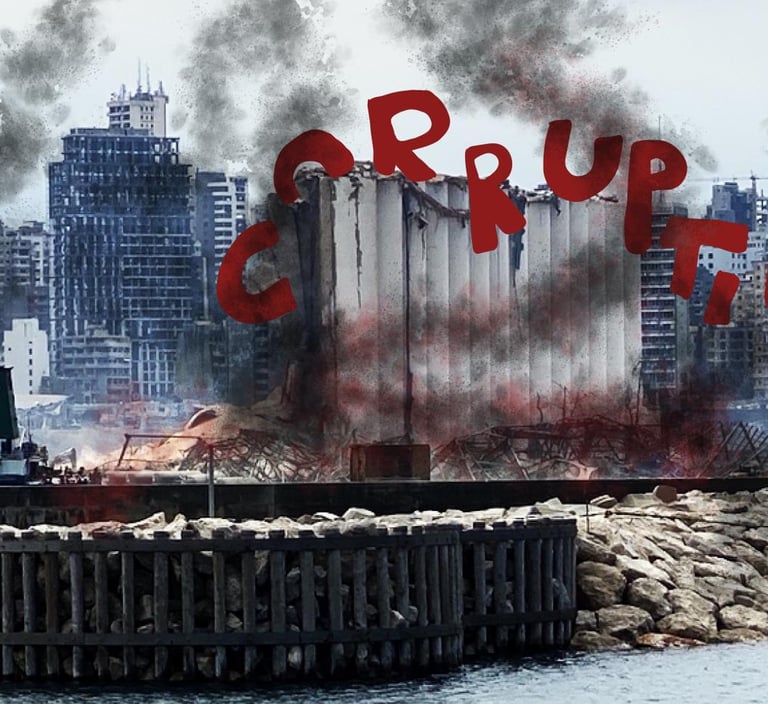Strategizing from 7 cities across the globe
Behind Beirut's Thalassocracy: A Study of the Systematic Corruption within the Beirut Port
Elie Joe J. Akiki Lynn Z. Farghal
Abstract
The Lebanese curriculum of Geography highlights the Beirut port as the strongest maritime administration in the east mediterranean coast. While this claim may have been true at some point in history, the new world order shifted the situation around, as the harbor found itself in ruins after facing the consequences of its deep-rooted corruption.
The Lebanese golden age witnessed an inexplicable economic boom in its absolute free market, which historians later described as “Le miracle Libanais” (The Lebanese miracle). However, this economic boom was nothing but the short run benefits of institutionalized corruption within the state’s administration and beyond. Notably, the Beirut port’s thalassocracy’s magnetism has been based on corruption and the ease of transactions. Its history is based upon adapting to new layers of corruption, as it was a weapon trade tool during the Lebanese civil war, and is now a hub of clientelist networks and favoritism between ruling class and wealthy businessmen. The Taif agreement created a new temporary committee to oversee customs affairs, which acted more like a business firm than a public administration. This system is still used today, as the committee’s board seats are being divided between the ruling class.
With the current allotment era, institutionalized nepotism in the customs administration became a massive burden to the state, as we started to witness the long-term dangerous damage of corruption. Tax evasion and illegitimate smuggling of goods created critical fallacies within the state’s treasury calculations, as only a fraction of the expected revenue arrives in the state’s hands. Moreover, with expanded popular clientelist networks, customs workers are not working under the rule of law, but under the surveillance of their patron, who employed them in order to facilitate the transactions of the wealthy business owners who fund his campaign.
Petty corruption was at least benefiting the private sector in the short-term, as the long run consequences turned out to be drastic. With the lack of the necessary funds, the customs’ efficiency dropped. The custom program “Najm” obtains low maintenance, workers keep on striking, and they are increasingly accepting bribes as their wage is minimal. Petty corruption also opened the gate for criminal enterprises, as Beirut’s port became a primary checkpoint for exporting Syrian narcotics. Considering the billions of captagon pills found hidden in goods imported from Beirut and the increased risks of drug smuggling, many countries like Kuwait and Saudi Arabia decided to cut commercial ties with Beirut.Armament trade accompanied the narco trade, as more and more militias and armed groups relied on the Beirut port’s leniency and lack of surveillance to smuggle illegitimate armaments within the region. Much weaponry material was left hidden and forgotten within the dockyards of Beirut, including the 2755 tons of ammonium nitrate in dockyard 12, which went unnoticed until the 4th of August 2020.
Many were warned about this ticking time bomb, and many who had raised concerns were found dead, such as Colonel Joseph Skaff in 2014. It is no secret that these explosives were not ‘forgotten’, but linked to layers and layers of corruption, clientelism, and militia rule. The ammonium nitrate cargo is not only linked to a certain corruptive file, but an endless matryoshka doll system of file after file opening. The domino effect that the investigation threatens to cause would put the whole administration at risk, revealing the deep-rooted nepotic mechanisms engraved in the customs. Moreover, the broad clientelist networks are protecting their people from customs workers to managers in order to maintain their personal benefits within the port.
However, corruption has never been as damaging as within the judiciary. While allotment expanded, judges were appointed by certain ruling people. This is creating an issue for investigators, as judges are constantly forbidding them of information that may harm their affiliations. The political class seems to blockade the investigation as it will definitely open many files, causing the increase of the rule of law over the rule of men.
International pressure is rising more and more, and while people are asking for their basic right of information, the corruption that they themselves created is blocking their access to justice. Within every policy implemented in the country, especially in the Beirut port, human greed is a primary variable. If we can make the ‘clean way’ more economically profitable than the endless series of bribes, corruption, and evasion, the core of this whole mechanism, institutionalized nepotism, would destroy itself, and justice may arrive one day or another.


Download the full document
Design by Huda Khalili
